Psychology Essay: Replication Crisis and Its Importance in Science
VerifiedAdded on 2023/01/04
|9
|2234
|1
Essay
AI Summary
This essay critically examines the replication crisis in psychology, a significant concern regarding the reproducibility of research findings. It explores the core issues, including the challenges in replicating studies, the role of Type I and Type II errors, and the impact of publication bias. The essay discusses the importance of replication in establishing the validity and reliability of psychological research, focusing on the factors that contribute to the difficulties in achieving consistent results. It analyzes the debates surrounding the crisis, referencing key articles and studies to provide a comprehensive understanding of the current state of the field and its implications for scientific integrity. The essay concludes by emphasizing the need for improved methodologies and a shift towards effect size estimation to enhance the reliability of psychological research. The essay also discusses the importance of replication in establishing the validity and reliability of psychological research.
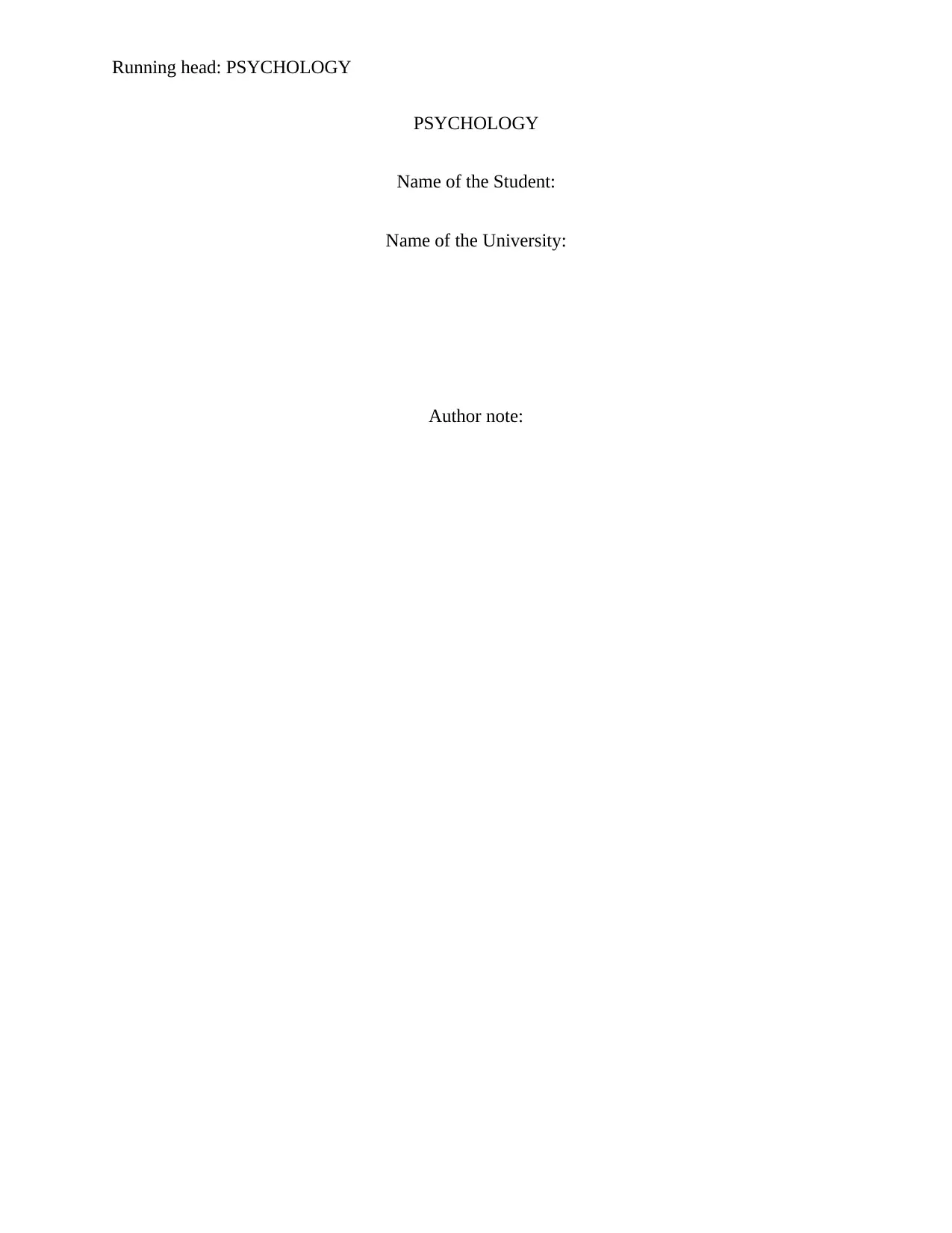
Running head: PSYCHOLOGY
PSYCHOLOGY
Name of the Student:
Name of the University:
Author note:
PSYCHOLOGY
Name of the Student:
Name of the University:
Author note:
Paraphrase This Document
Need a fresh take? Get an instant paraphrase of this document with our AI Paraphraser
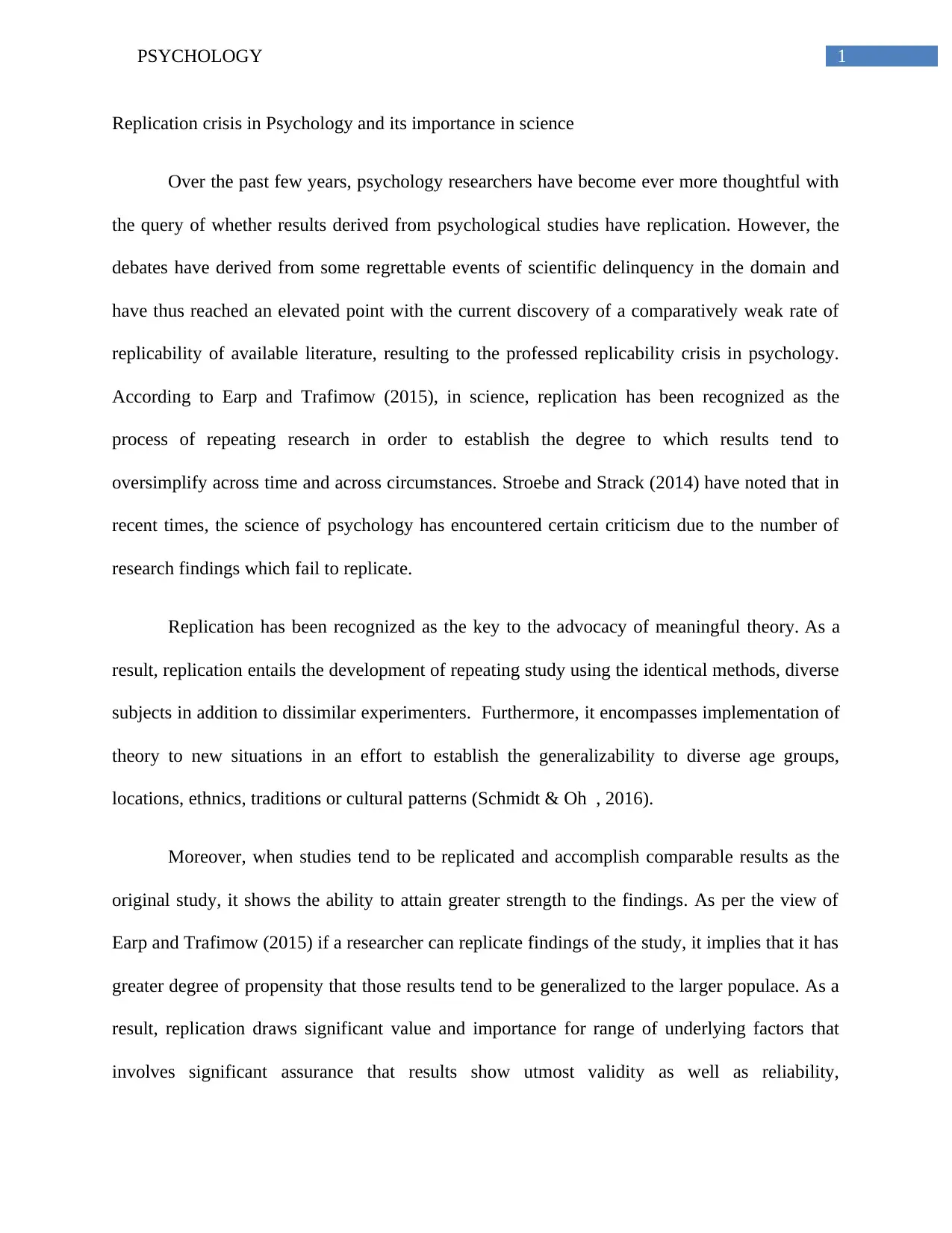
1PSYCHOLOGY
Replication crisis in Psychology and its importance in science
Over the past few years, psychology researchers have become ever more thoughtful with
the query of whether results derived from psychological studies have replication. However, the
debates have derived from some regrettable events of scientific delinquency in the domain and
have thus reached an elevated point with the current discovery of a comparatively weak rate of
replicability of available literature, resulting to the professed replicability crisis in psychology.
According to Earp and Trafimow (2015), in science, replication has been recognized as the
process of repeating research in order to establish the degree to which results tend to
oversimplify across time and across circumstances. Stroebe and Strack (2014) have noted that in
recent times, the science of psychology has encountered certain criticism due to the number of
research findings which fail to replicate.
Replication has been recognized as the key to the advocacy of meaningful theory. As a
result, replication entails the development of repeating study using the identical methods, diverse
subjects in addition to dissimilar experimenters. Furthermore, it encompasses implementation of
theory to new situations in an effort to establish the generalizability to diverse age groups,
locations, ethnics, traditions or cultural patterns (Schmidt & Oh , 2016).
Moreover, when studies tend to be replicated and accomplish comparable results as the
original study, it shows the ability to attain greater strength to the findings. As per the view of
Earp and Trafimow (2015) if a researcher can replicate findings of the study, it implies that it has
greater degree of propensity that those results tend to be generalized to the larger populace. As a
result, replication draws significant value and importance for range of underlying factors that
involves significant assurance that results show utmost validity as well as reliability,
Replication crisis in Psychology and its importance in science
Over the past few years, psychology researchers have become ever more thoughtful with
the query of whether results derived from psychological studies have replication. However, the
debates have derived from some regrettable events of scientific delinquency in the domain and
have thus reached an elevated point with the current discovery of a comparatively weak rate of
replicability of available literature, resulting to the professed replicability crisis in psychology.
According to Earp and Trafimow (2015), in science, replication has been recognized as the
process of repeating research in order to establish the degree to which results tend to
oversimplify across time and across circumstances. Stroebe and Strack (2014) have noted that in
recent times, the science of psychology has encountered certain criticism due to the number of
research findings which fail to replicate.
Replication has been recognized as the key to the advocacy of meaningful theory. As a
result, replication entails the development of repeating study using the identical methods, diverse
subjects in addition to dissimilar experimenters. Furthermore, it encompasses implementation of
theory to new situations in an effort to establish the generalizability to diverse age groups,
locations, ethnics, traditions or cultural patterns (Schmidt & Oh , 2016).
Moreover, when studies tend to be replicated and accomplish comparable results as the
original study, it shows the ability to attain greater strength to the findings. As per the view of
Earp and Trafimow (2015) if a researcher can replicate findings of the study, it implies that it has
greater degree of propensity that those results tend to be generalized to the larger populace. As a
result, replication draws significant value and importance for range of underlying factors that
involves significant assurance that results show utmost validity as well as reliability,
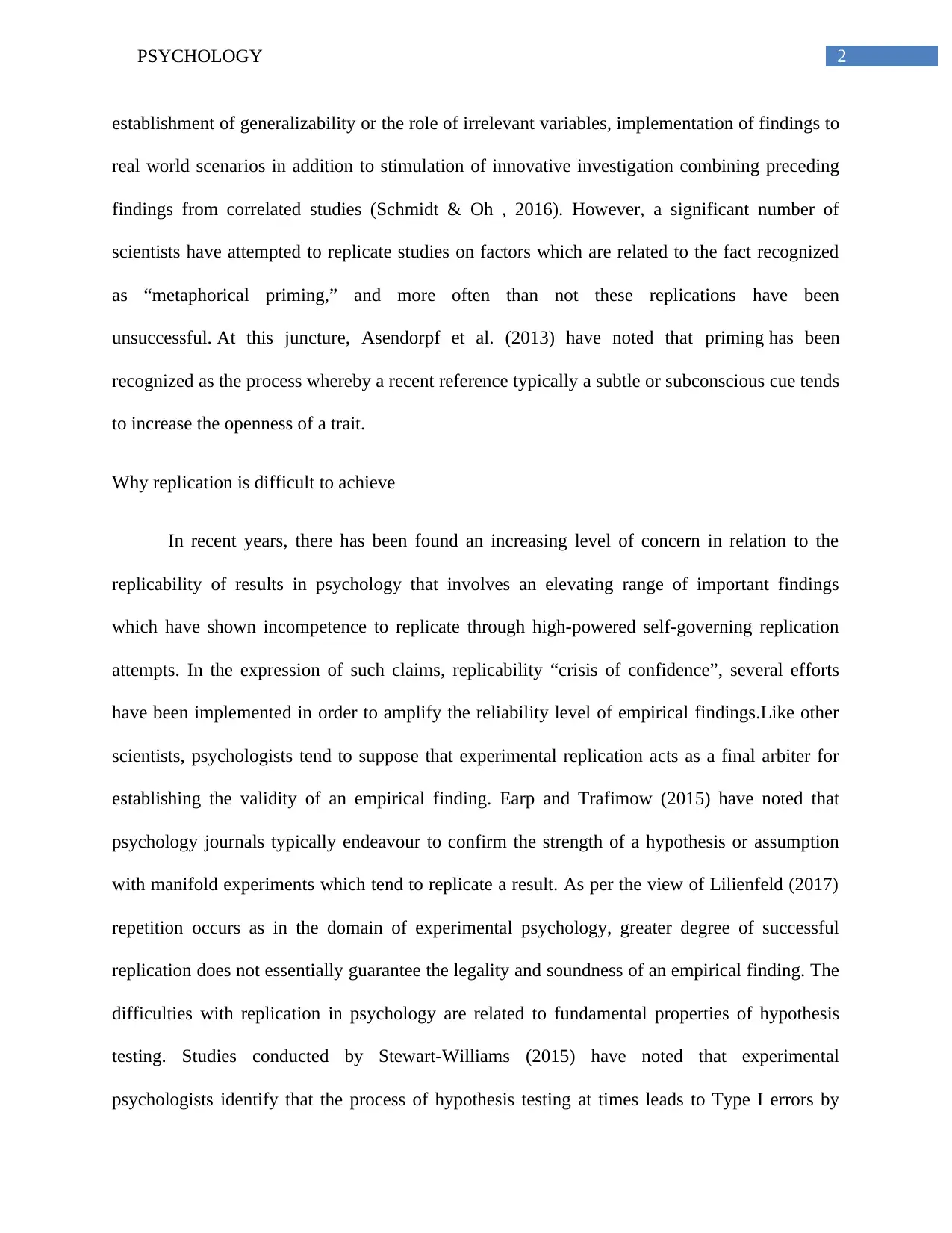
2PSYCHOLOGY
establishment of generalizability or the role of irrelevant variables, implementation of findings to
real world scenarios in addition to stimulation of innovative investigation combining preceding
findings from correlated studies (Schmidt & Oh , 2016). However, a significant number of
scientists have attempted to replicate studies on factors which are related to the fact recognized
as “metaphorical priming,” and more often than not these replications have been
unsuccessful. At this juncture, Asendorpf et al. (2013) have noted that priming has been
recognized as the process whereby a recent reference typically a subtle or subconscious cue tends
to increase the openness of a trait.
Why replication is difficult to achieve
In recent years, there has been found an increasing level of concern in relation to the
replicability of results in psychology that involves an elevating range of important findings
which have shown incompetence to replicate through high-powered self-governing replication
attempts. In the expression of such claims, replicability “crisis of confidence”, several efforts
have been implemented in order to amplify the reliability level of empirical findings.Like other
scientists, psychologists tend to suppose that experimental replication acts as a final arbiter for
establishing the validity of an empirical finding. Earp and Trafimow (2015) have noted that
psychology journals typically endeavour to confirm the strength of a hypothesis or assumption
with manifold experiments which tend to replicate a result. As per the view of Lilienfeld (2017)
repetition occurs as in the domain of experimental psychology, greater degree of successful
replication does not essentially guarantee the legality and soundness of an empirical finding. The
difficulties with replication in psychology are related to fundamental properties of hypothesis
testing. Studies conducted by Stewart-Williams (2015) have noted that experimental
psychologists identify that the process of hypothesis testing at times leads to Type I errors by
establishment of generalizability or the role of irrelevant variables, implementation of findings to
real world scenarios in addition to stimulation of innovative investigation combining preceding
findings from correlated studies (Schmidt & Oh , 2016). However, a significant number of
scientists have attempted to replicate studies on factors which are related to the fact recognized
as “metaphorical priming,” and more often than not these replications have been
unsuccessful. At this juncture, Asendorpf et al. (2013) have noted that priming has been
recognized as the process whereby a recent reference typically a subtle or subconscious cue tends
to increase the openness of a trait.
Why replication is difficult to achieve
In recent years, there has been found an increasing level of concern in relation to the
replicability of results in psychology that involves an elevating range of important findings
which have shown incompetence to replicate through high-powered self-governing replication
attempts. In the expression of such claims, replicability “crisis of confidence”, several efforts
have been implemented in order to amplify the reliability level of empirical findings.Like other
scientists, psychologists tend to suppose that experimental replication acts as a final arbiter for
establishing the validity of an empirical finding. Earp and Trafimow (2015) have noted that
psychology journals typically endeavour to confirm the strength of a hypothesis or assumption
with manifold experiments which tend to replicate a result. As per the view of Lilienfeld (2017)
repetition occurs as in the domain of experimental psychology, greater degree of successful
replication does not essentially guarantee the legality and soundness of an empirical finding. The
difficulties with replication in psychology are related to fundamental properties of hypothesis
testing. Studies conducted by Stewart-Williams (2015) have noted that experimental
psychologists identify that the process of hypothesis testing at times leads to Type I errors by
⊘ This is a preview!⊘
Do you want full access?
Subscribe today to unlock all pages.

Trusted by 1+ million students worldwide
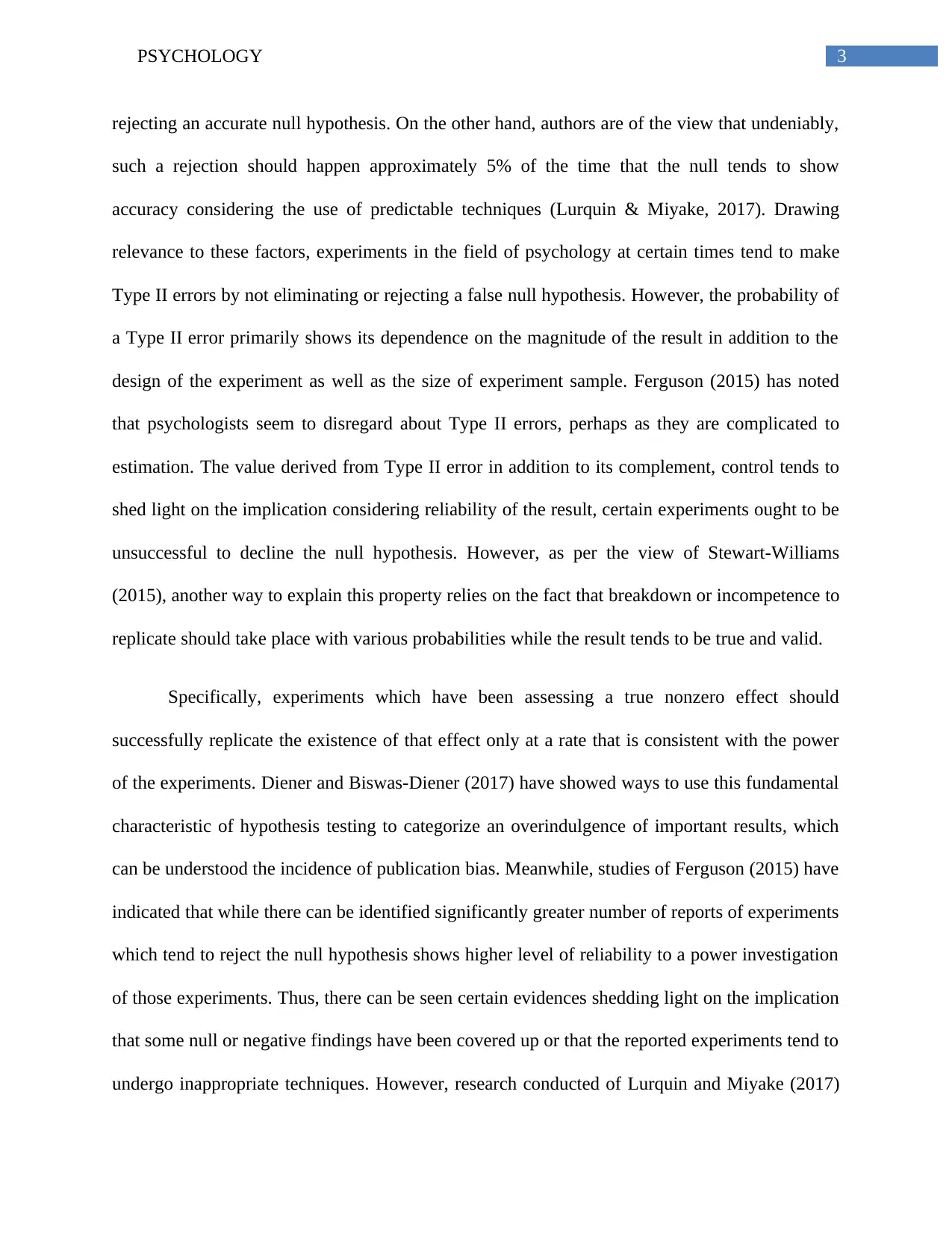
3PSYCHOLOGY
rejecting an accurate null hypothesis. On the other hand, authors are of the view that undeniably,
such a rejection should happen approximately 5% of the time that the null tends to show
accuracy considering the use of predictable techniques (Lurquin & Miyake, 2017). Drawing
relevance to these factors, experiments in the field of psychology at certain times tend to make
Type II errors by not eliminating or rejecting a false null hypothesis. However, the probability of
a Type II error primarily shows its dependence on the magnitude of the result in addition to the
design of the experiment as well as the size of experiment sample. Ferguson (2015) has noted
that psychologists seem to disregard about Type II errors, perhaps as they are complicated to
estimation. The value derived from Type II error in addition to its complement, control tends to
shed light on the implication considering reliability of the result, certain experiments ought to be
unsuccessful to decline the null hypothesis. However, as per the view of Stewart-Williams
(2015), another way to explain this property relies on the fact that breakdown or incompetence to
replicate should take place with various probabilities while the result tends to be true and valid.
Specifically, experiments which have been assessing a true nonzero effect should
successfully replicate the existence of that effect only at a rate that is consistent with the power
of the experiments. Diener and Biswas-Diener (2017) have showed ways to use this fundamental
characteristic of hypothesis testing to categorize an overindulgence of important results, which
can be understood the incidence of publication bias. Meanwhile, studies of Ferguson (2015) have
indicated that while there can be identified significantly greater number of reports of experiments
which tend to reject the null hypothesis shows higher level of reliability to a power investigation
of those experiments. Thus, there can be seen certain evidences shedding light on the implication
that some null or negative findings have been covered up or that the reported experiments tend to
undergo inappropriate techniques. However, research conducted of Lurquin and Miyake (2017)
rejecting an accurate null hypothesis. On the other hand, authors are of the view that undeniably,
such a rejection should happen approximately 5% of the time that the null tends to show
accuracy considering the use of predictable techniques (Lurquin & Miyake, 2017). Drawing
relevance to these factors, experiments in the field of psychology at certain times tend to make
Type II errors by not eliminating or rejecting a false null hypothesis. However, the probability of
a Type II error primarily shows its dependence on the magnitude of the result in addition to the
design of the experiment as well as the size of experiment sample. Ferguson (2015) has noted
that psychologists seem to disregard about Type II errors, perhaps as they are complicated to
estimation. The value derived from Type II error in addition to its complement, control tends to
shed light on the implication considering reliability of the result, certain experiments ought to be
unsuccessful to decline the null hypothesis. However, as per the view of Stewart-Williams
(2015), another way to explain this property relies on the fact that breakdown or incompetence to
replicate should take place with various probabilities while the result tends to be true and valid.
Specifically, experiments which have been assessing a true nonzero effect should
successfully replicate the existence of that effect only at a rate that is consistent with the power
of the experiments. Diener and Biswas-Diener (2017) have showed ways to use this fundamental
characteristic of hypothesis testing to categorize an overindulgence of important results, which
can be understood the incidence of publication bias. Meanwhile, studies of Ferguson (2015) have
indicated that while there can be identified significantly greater number of reports of experiments
which tend to reject the null hypothesis shows higher level of reliability to a power investigation
of those experiments. Thus, there can be seen certain evidences shedding light on the implication
that some null or negative findings have been covered up or that the reported experiments tend to
undergo inappropriate techniques. However, research conducted of Lurquin and Miyake (2017)
Paraphrase This Document
Need a fresh take? Get an instant paraphrase of this document with our AI Paraphraser
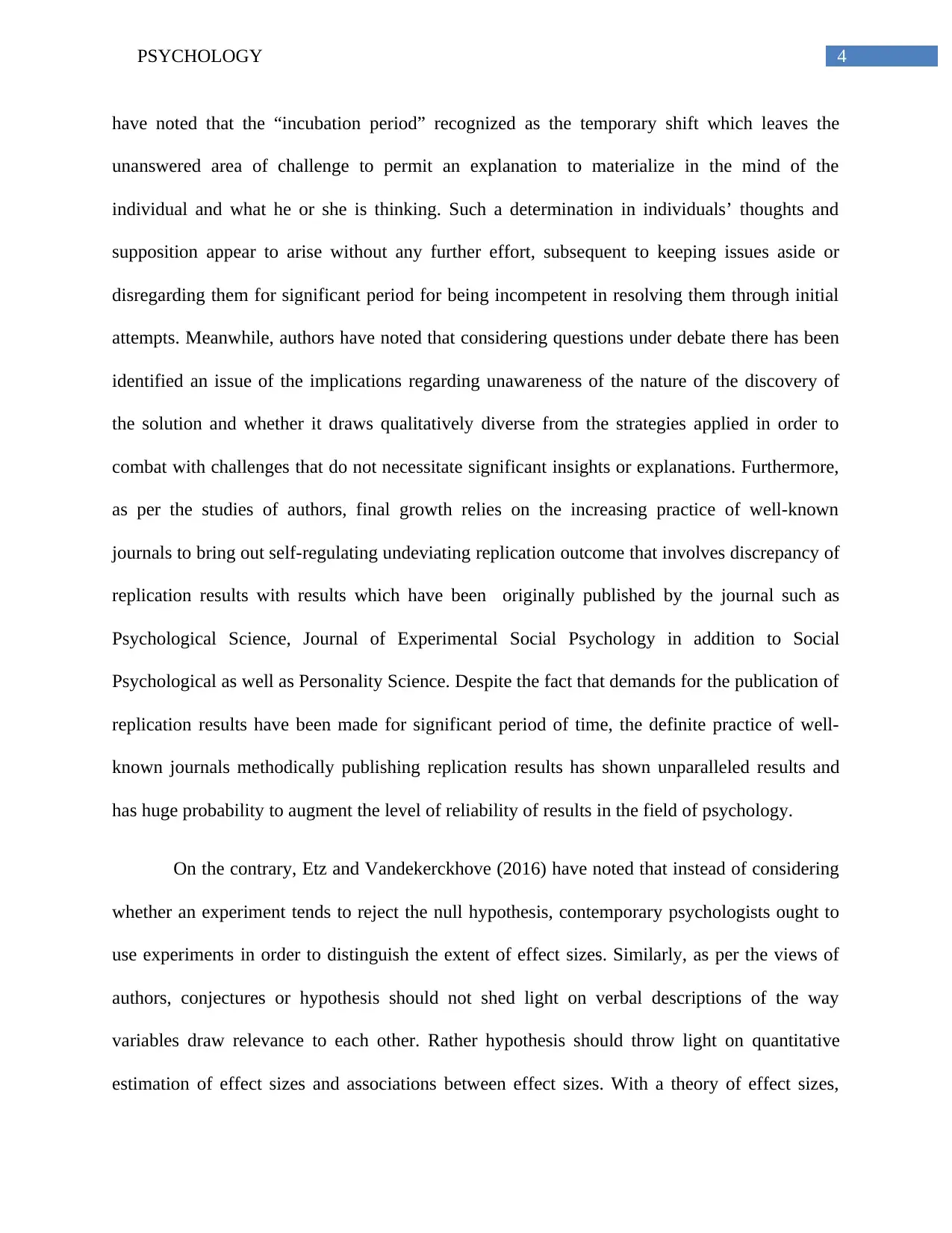
4PSYCHOLOGY
have noted that the “incubation period” recognized as the temporary shift which leaves the
unanswered area of challenge to permit an explanation to materialize in the mind of the
individual and what he or she is thinking. Such a determination in individuals’ thoughts and
supposition appear to arise without any further effort, subsequent to keeping issues aside or
disregarding them for significant period for being incompetent in resolving them through initial
attempts. Meanwhile, authors have noted that considering questions under debate there has been
identified an issue of the implications regarding unawareness of the nature of the discovery of
the solution and whether it draws qualitatively diverse from the strategies applied in order to
combat with challenges that do not necessitate significant insights or explanations. Furthermore,
as per the studies of authors, final growth relies on the increasing practice of well-known
journals to bring out self-regulating undeviating replication outcome that involves discrepancy of
replication results with results which have been originally published by the journal such as
Psychological Science, Journal of Experimental Social Psychology in addition to Social
Psychological as well as Personality Science. Despite the fact that demands for the publication of
replication results have been made for significant period of time, the definite practice of well-
known journals methodically publishing replication results has shown unparalleled results and
has huge probability to augment the level of reliability of results in the field of psychology.
On the contrary, Etz and Vandekerckhove (2016) have noted that instead of considering
whether an experiment tends to reject the null hypothesis, contemporary psychologists ought to
use experiments in order to distinguish the extent of effect sizes. Similarly, as per the views of
authors, conjectures or hypothesis should not shed light on verbal descriptions of the way
variables draw relevance to each other. Rather hypothesis should throw light on quantitative
estimation of effect sizes and associations between effect sizes. With a theory of effect sizes,
have noted that the “incubation period” recognized as the temporary shift which leaves the
unanswered area of challenge to permit an explanation to materialize in the mind of the
individual and what he or she is thinking. Such a determination in individuals’ thoughts and
supposition appear to arise without any further effort, subsequent to keeping issues aside or
disregarding them for significant period for being incompetent in resolving them through initial
attempts. Meanwhile, authors have noted that considering questions under debate there has been
identified an issue of the implications regarding unawareness of the nature of the discovery of
the solution and whether it draws qualitatively diverse from the strategies applied in order to
combat with challenges that do not necessitate significant insights or explanations. Furthermore,
as per the studies of authors, final growth relies on the increasing practice of well-known
journals to bring out self-regulating undeviating replication outcome that involves discrepancy of
replication results with results which have been originally published by the journal such as
Psychological Science, Journal of Experimental Social Psychology in addition to Social
Psychological as well as Personality Science. Despite the fact that demands for the publication of
replication results have been made for significant period of time, the definite practice of well-
known journals methodically publishing replication results has shown unparalleled results and
has huge probability to augment the level of reliability of results in the field of psychology.
On the contrary, Etz and Vandekerckhove (2016) have noted that instead of considering
whether an experiment tends to reject the null hypothesis, contemporary psychologists ought to
use experiments in order to distinguish the extent of effect sizes. Similarly, as per the views of
authors, conjectures or hypothesis should not shed light on verbal descriptions of the way
variables draw relevance to each other. Rather hypothesis should throw light on quantitative
estimation of effect sizes and associations between effect sizes. With a theory of effect sizes,
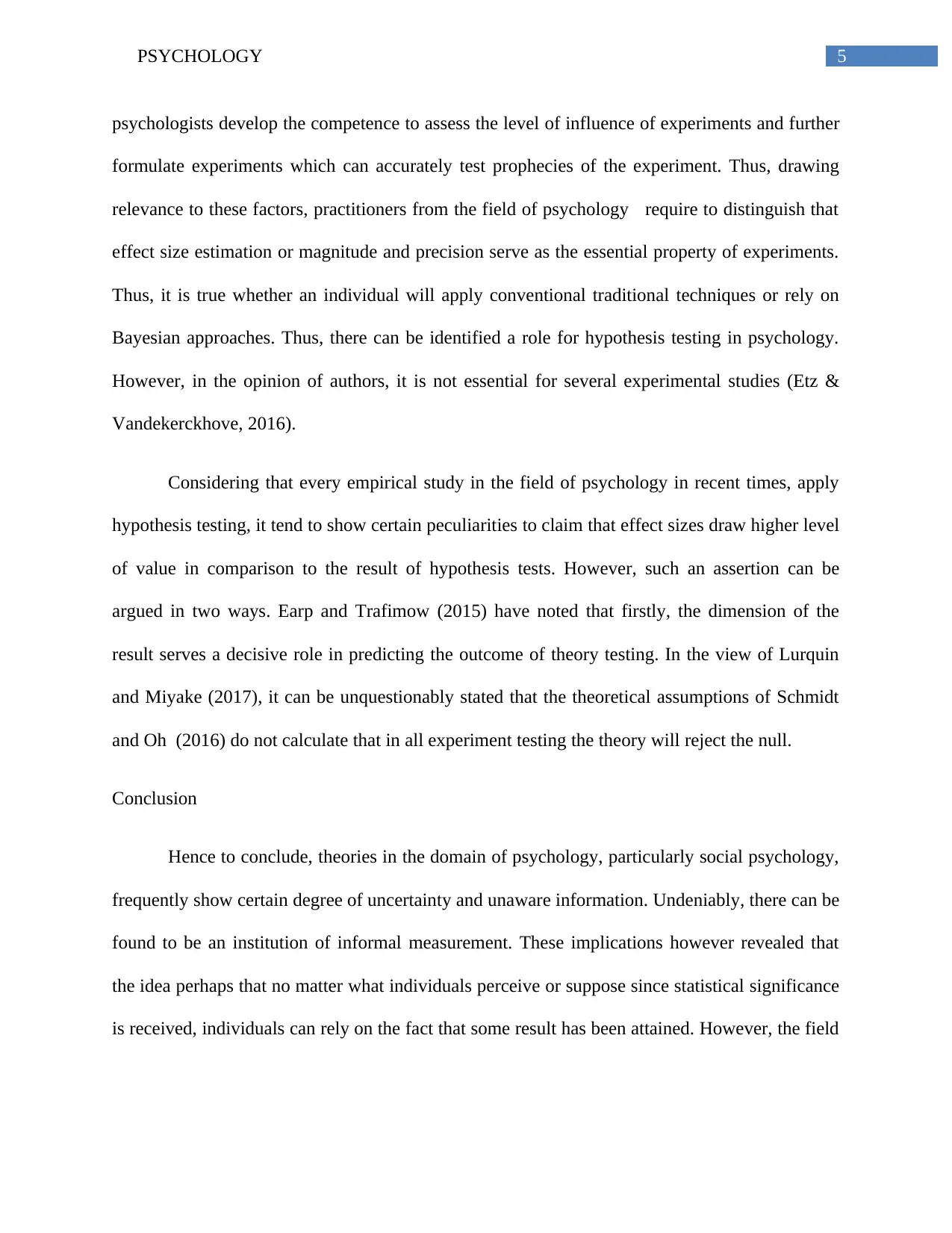
5PSYCHOLOGY
psychologists develop the competence to assess the level of influence of experiments and further
formulate experiments which can accurately test prophecies of the experiment. Thus, drawing
relevance to these factors, practitioners from the field of psychology require to distinguish that
effect size estimation or magnitude and precision serve as the essential property of experiments.
Thus, it is true whether an individual will apply conventional traditional techniques or rely on
Bayesian approaches. Thus, there can be identified a role for hypothesis testing in psychology.
However, in the opinion of authors, it is not essential for several experimental studies (Etz &
Vandekerckhove, 2016).
Considering that every empirical study in the field of psychology in recent times, apply
hypothesis testing, it tend to show certain peculiarities to claim that effect sizes draw higher level
of value in comparison to the result of hypothesis tests. However, such an assertion can be
argued in two ways. Earp and Trafimow (2015) have noted that firstly, the dimension of the
result serves a decisive role in predicting the outcome of theory testing. In the view of Lurquin
and Miyake (2017), it can be unquestionably stated that the theoretical assumptions of Schmidt
and Oh (2016) do not calculate that in all experiment testing the theory will reject the null.
Conclusion
Hence to conclude, theories in the domain of psychology, particularly social psychology,
frequently show certain degree of uncertainty and unaware information. Undeniably, there can be
found to be an institution of informal measurement. These implications however revealed that
the idea perhaps that no matter what individuals perceive or suppose since statistical significance
is received, individuals can rely on the fact that some result has been attained. However, the field
psychologists develop the competence to assess the level of influence of experiments and further
formulate experiments which can accurately test prophecies of the experiment. Thus, drawing
relevance to these factors, practitioners from the field of psychology require to distinguish that
effect size estimation or magnitude and precision serve as the essential property of experiments.
Thus, it is true whether an individual will apply conventional traditional techniques or rely on
Bayesian approaches. Thus, there can be identified a role for hypothesis testing in psychology.
However, in the opinion of authors, it is not essential for several experimental studies (Etz &
Vandekerckhove, 2016).
Considering that every empirical study in the field of psychology in recent times, apply
hypothesis testing, it tend to show certain peculiarities to claim that effect sizes draw higher level
of value in comparison to the result of hypothesis tests. However, such an assertion can be
argued in two ways. Earp and Trafimow (2015) have noted that firstly, the dimension of the
result serves a decisive role in predicting the outcome of theory testing. In the view of Lurquin
and Miyake (2017), it can be unquestionably stated that the theoretical assumptions of Schmidt
and Oh (2016) do not calculate that in all experiment testing the theory will reject the null.
Conclusion
Hence to conclude, theories in the domain of psychology, particularly social psychology,
frequently show certain degree of uncertainty and unaware information. Undeniably, there can be
found to be an institution of informal measurement. These implications however revealed that
the idea perhaps that no matter what individuals perceive or suppose since statistical significance
is received, individuals can rely on the fact that some result has been attained. However, the field
⊘ This is a preview!⊘
Do you want full access?
Subscribe today to unlock all pages.

Trusted by 1+ million students worldwide
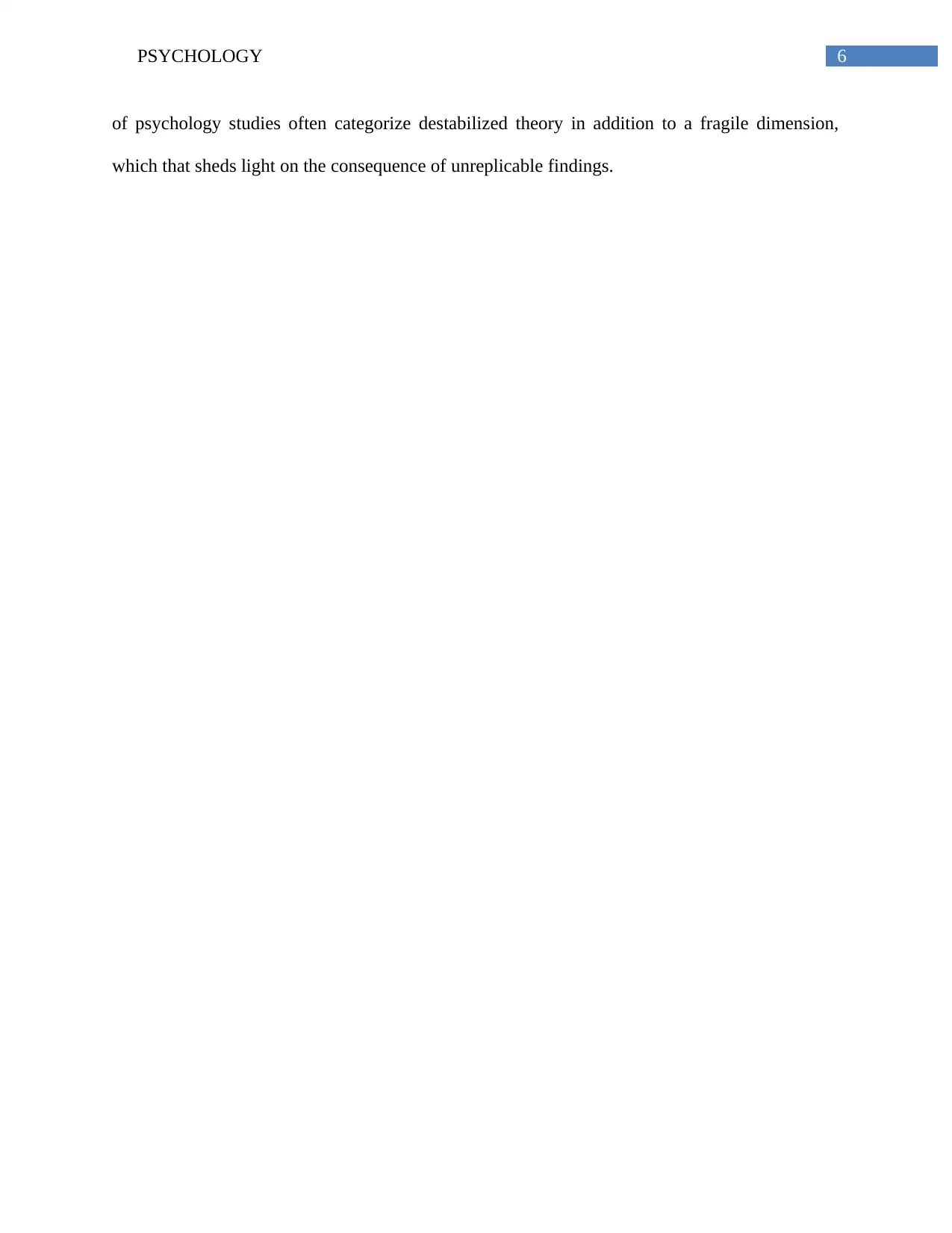
6PSYCHOLOGY
of psychology studies often categorize destabilized theory in addition to a fragile dimension,
which that sheds light on the consequence of unreplicable findings.
of psychology studies often categorize destabilized theory in addition to a fragile dimension,
which that sheds light on the consequence of unreplicable findings.
Paraphrase This Document
Need a fresh take? Get an instant paraphrase of this document with our AI Paraphraser
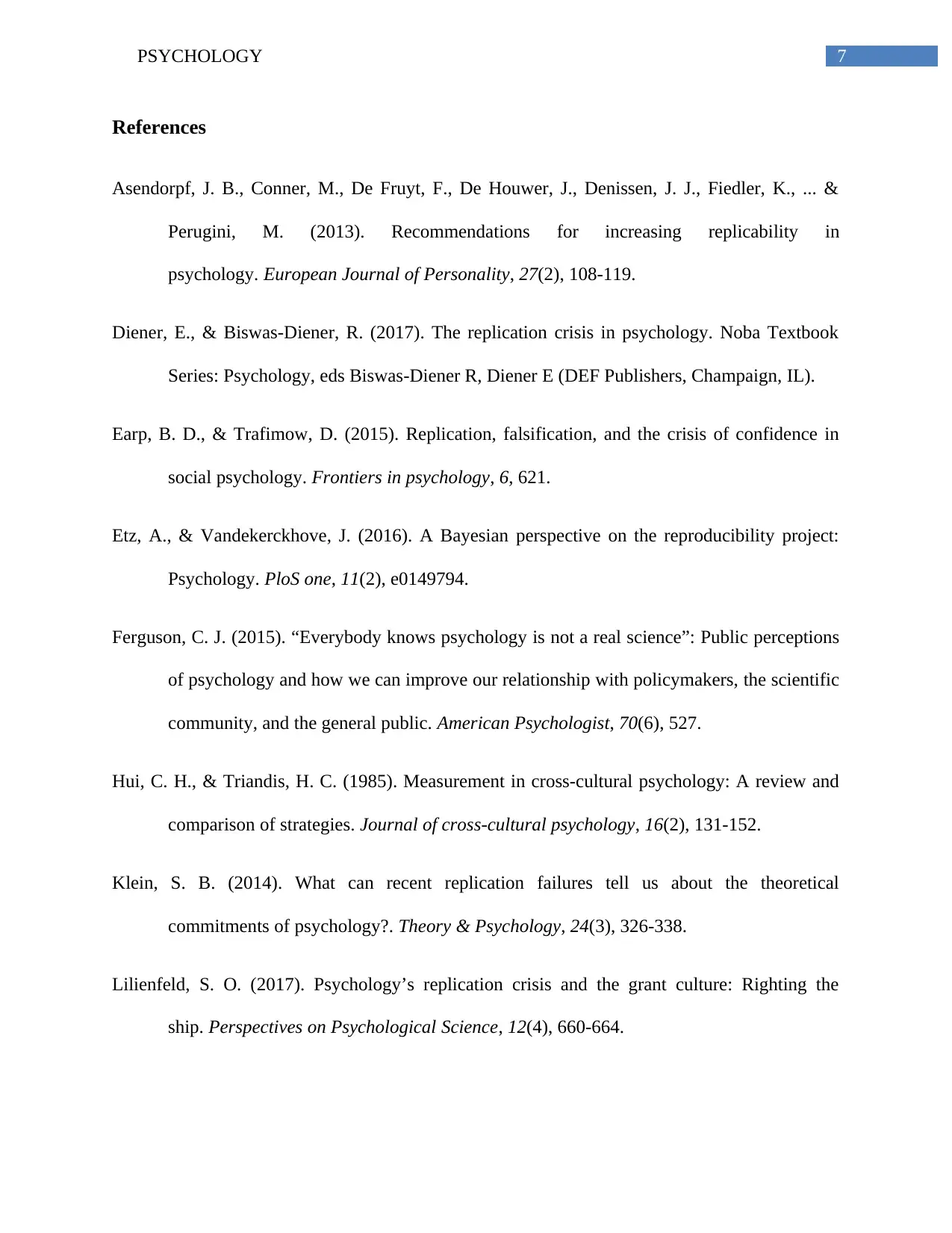
7PSYCHOLOGY
References
Asendorpf, J. B., Conner, M., De Fruyt, F., De Houwer, J., Denissen, J. J., Fiedler, K., ... &
Perugini, M. (2013). Recommendations for increasing replicability in
psychology. European Journal of Personality, 27(2), 108-119.
Diener, E., & Biswas-Diener, R. (2017). The replication crisis in psychology. Noba Textbook
Series: Psychology, eds Biswas-Diener R, Diener E (DEF Publishers, Champaign, IL).
Earp, B. D., & Trafimow, D. (2015). Replication, falsification, and the crisis of confidence in
social psychology. Frontiers in psychology, 6, 621.
Etz, A., & Vandekerckhove, J. (2016). A Bayesian perspective on the reproducibility project:
Psychology. PloS one, 11(2), e0149794.
Ferguson, C. J. (2015). “Everybody knows psychology is not a real science”: Public perceptions
of psychology and how we can improve our relationship with policymakers, the scientific
community, and the general public. American Psychologist, 70(6), 527.
Hui, C. H., & Triandis, H. C. (1985). Measurement in cross-cultural psychology: A review and
comparison of strategies. Journal of cross-cultural psychology, 16(2), 131-152.
Klein, S. B. (2014). What can recent replication failures tell us about the theoretical
commitments of psychology?. Theory & Psychology, 24(3), 326-338.
Lilienfeld, S. O. (2017). Psychology’s replication crisis and the grant culture: Righting the
ship. Perspectives on Psychological Science, 12(4), 660-664.
References
Asendorpf, J. B., Conner, M., De Fruyt, F., De Houwer, J., Denissen, J. J., Fiedler, K., ... &
Perugini, M. (2013). Recommendations for increasing replicability in
psychology. European Journal of Personality, 27(2), 108-119.
Diener, E., & Biswas-Diener, R. (2017). The replication crisis in psychology. Noba Textbook
Series: Psychology, eds Biswas-Diener R, Diener E (DEF Publishers, Champaign, IL).
Earp, B. D., & Trafimow, D. (2015). Replication, falsification, and the crisis of confidence in
social psychology. Frontiers in psychology, 6, 621.
Etz, A., & Vandekerckhove, J. (2016). A Bayesian perspective on the reproducibility project:
Psychology. PloS one, 11(2), e0149794.
Ferguson, C. J. (2015). “Everybody knows psychology is not a real science”: Public perceptions
of psychology and how we can improve our relationship with policymakers, the scientific
community, and the general public. American Psychologist, 70(6), 527.
Hui, C. H., & Triandis, H. C. (1985). Measurement in cross-cultural psychology: A review and
comparison of strategies. Journal of cross-cultural psychology, 16(2), 131-152.
Klein, S. B. (2014). What can recent replication failures tell us about the theoretical
commitments of psychology?. Theory & Psychology, 24(3), 326-338.
Lilienfeld, S. O. (2017). Psychology’s replication crisis and the grant culture: Righting the
ship. Perspectives on Psychological Science, 12(4), 660-664.
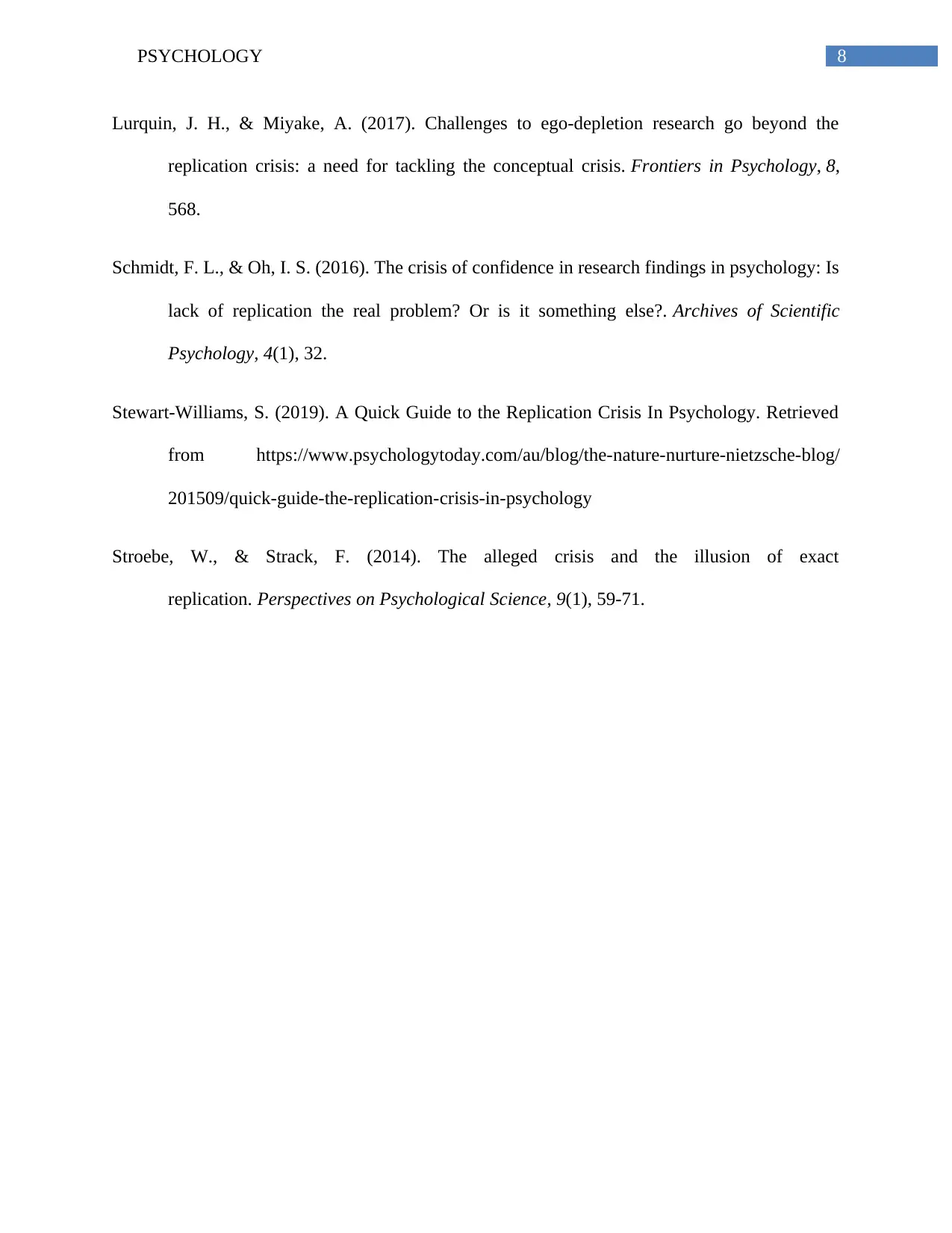
8PSYCHOLOGY
Lurquin, J. H., & Miyake, A. (2017). Challenges to ego-depletion research go beyond the
replication crisis: a need for tackling the conceptual crisis. Frontiers in Psychology, 8,
568.
Schmidt, F. L., & Oh, I. S. (2016). The crisis of confidence in research findings in psychology: Is
lack of replication the real problem? Or is it something else?. Archives of Scientific
Psychology, 4(1), 32.
Stewart-Williams, S. (2019). A Quick Guide to the Replication Crisis In Psychology. Retrieved
from https://www.psychologytoday.com/au/blog/the-nature-nurture-nietzsche-blog/
201509/quick-guide-the-replication-crisis-in-psychology
Stroebe, W., & Strack, F. (2014). The alleged crisis and the illusion of exact
replication. Perspectives on Psychological Science, 9(1), 59-71.
Lurquin, J. H., & Miyake, A. (2017). Challenges to ego-depletion research go beyond the
replication crisis: a need for tackling the conceptual crisis. Frontiers in Psychology, 8,
568.
Schmidt, F. L., & Oh, I. S. (2016). The crisis of confidence in research findings in psychology: Is
lack of replication the real problem? Or is it something else?. Archives of Scientific
Psychology, 4(1), 32.
Stewart-Williams, S. (2019). A Quick Guide to the Replication Crisis In Psychology. Retrieved
from https://www.psychologytoday.com/au/blog/the-nature-nurture-nietzsche-blog/
201509/quick-guide-the-replication-crisis-in-psychology
Stroebe, W., & Strack, F. (2014). The alleged crisis and the illusion of exact
replication. Perspectives on Psychological Science, 9(1), 59-71.
⊘ This is a preview!⊘
Do you want full access?
Subscribe today to unlock all pages.

Trusted by 1+ million students worldwide
1 out of 9
Your All-in-One AI-Powered Toolkit for Academic Success.
+13062052269
info@desklib.com
Available 24*7 on WhatsApp / Email
![[object Object]](/_next/static/media/star-bottom.7253800d.svg)
Unlock your academic potential
Copyright © 2020–2026 A2Z Services. All Rights Reserved. Developed and managed by ZUCOL.